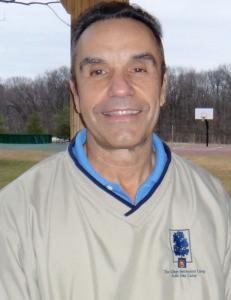College Settlement celebrates the 100th anniversary of their summer camp programs in 2022.
College Settlement camp programs are celebrating their 100th anniversary in 2022.

Frank Gerome, the former Executive Director of College Settlement of Philadelphia, was associated with the camp programs for 48 years.
Witness to 48 of College Settlement Camp’s 100 Years, Frank Gerome Shares Memories of a former Camp Counselor and Executive Director (Among other Things!)
HORSHAM, PENNSYLVANIA, UNITED STATES, March 10, 2022 /EINPresswire.com/ — In celebration of the 100th anniversary of the College Settlement of Philadelphia’s camp programs, alumni are sharing their stories of how their experiences at the Horsham and Spruce Run camps changed their lives.
One such tale is that of Frank Gerome – spanning 48 years of College Settlement history. In the summer of 1965, Gerome, then 18 years old, started working as a camp counselor at the College Settlement Camp in Horsham. He had been a camp counselor at other camps over the previous two summers and had heard about the opening at College Settlement through a placement agency.
“I grew up in South Philadelphia,” said Gerome. “At that time, there were many settlement houses in South Philadelphia, and many of them had their own camps. The settlement house I worked for initially was Reade Street Settlement House, and they had a camp that I initially worked for. The College Settlement House was five blocks away from where I lived. All those camps are gone now, except for College Settlement.”
Gerome worked at College Settlement Camps as a counselor from 1965 through 1971. He studied elementary education at West Chester State College (now University) and began teaching in the area in 1968. Gerome taught until 1972, when he was hired full-time by long-time Executive Director Leonard Ferguson to develop a new program, the Outdoor School. He also served as the full-time assistant to Ferguson to run the summer camp program and developing programs during the year.
“College Settlement was blessed with a board of very interested and philanthropic people, who kept College Settlement going, hand to mouth for many, many years, until Elizabeth England came along,” Gerome said. He noted the important role that the late Miss England played in the financial health of the organization. She became a Trustee of College Settlement in the early 1960s, and is a prime example of the character, interest and dedication of College Settlement’s board of Trustees over the years. When Miss England passed away in 1973, the England Trust Fund was provided which guarantees the financial security of the organization and its continued operation. Her legacy lives on in College Settlement’s current programs and offerings, especially in the summer camp programs.
“Probably the main reason that College Settlement was able to continue, when the other settlement houses and camps disappeared, was where they located the camps, in Horsham,” said Gerome. “These good people saw the need and invested the time and the money to keep that camp location going, and growing, getting out of Philadelphia. Miss England left an endowment, and so did the late Dr. Walter Cornell, so that College Settlement can continue after all the other camps closed.”
Gerome recalled that the settlement camp he worked at previously, at Crum Creek, “didn’t have the money to continue, so they just had to give up. Land prices were changing, people were moving out of the city to the suburbs, building homes. And the other settlement houses just couldn’t afford to keep those properties. The camps were always secondary to the properties that the settlement houses had in the city. And for the other settlement houses, the camps were the first thing they sold when money was short.
“It’s my opinion that one of the reasons that the College Settlement started the camp was because of the Spanish Flu pandemic that began in 1918,” said Gerome. “If you look at the timeline, it fits right in, where the feeling was, we have to get these kids out of the city in the summer and keep them healthy. I think the underlying reason that College Settlement is still there is because people like (former College Settlement Executive Director and Gerome’s predecessor) Leonard Ferguson, and George Kevlin, who was instrumental in getting Miss England on the board in the 30s because he was her estate lawyer. Both men worked to make sure that College Settlement stayed on a strong financial footing. As did Dr. Walter Cornell, who founded the Kuhn Day Camp program. The bottom line was that those people were dedicated to seeing College Settlement continue. They made the decision in the late 1940s to close the settlement house in South Philadelphia, rather than close the camp, which the other settlement houses were doing.”
The College Settlement of Philadelphia was one of the first such settlement houses in Philadelphia, and at the time of its founding, served as a place where recent immigrants to the United States, in particular those from Italy, could take classes to learn to speak, read, and write in English and adapt to the customs of their new country. Civics, cooking, healthcare, learning how to deal with local government – “they learned how to deal with the American way of life,” Gerome noted.
“I grew up in a South Philadelphia neighborhood with a very large Italian presence,” said Gerome. “My grandmother came here from Italy as a young girl. And she died at 93 and could not speak English. And the reason she didn’t have to speak English was because the community was tiny and everyone spoke Italian in the shops, the churches, and the neighborhood. But as communities like South Philadelphia changed with new immigrants from other countries, the settlement houses couldn’t keep up, so they disappeared. College Settlement had the foresight to see that the neighborhoods were going to change, and the houses weren’t in the future. The future was in the camp, not in the settlement house.”
Jim DeLorenzo
Jim DeLorenzo Public Relations
+1 215-266-5943
jim@jhdenterprises.com
A video tour of College Settlement Camp!
![]()


 ,
,
